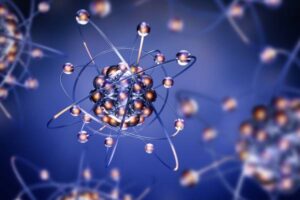
GHK-Cu Capsules: Copper Peptides For Skin
GHK-Cu Capsules: Copper Peptides For Skin In an ever-evolving world of beauty standards, the quest for vibrant, healthy skin remains
AICAR, short for 5-aminoimidazole-4-carboxamide ribonucleoside, is a naturally occurring substance that plays a significant role in energy balance and various metabolic pathways. It’s an allosteric activator of AMP-activated protein kinase (AMPK), a protein involved in cellular energy homeostasis. In the athletic world, AICA Ribonucleotide has been noted for its potential to improve athletic performance, although it’s considered a prohibited substance [1]. It’s also used widely in research due to its ability to modulate role of AMPK signalling especially surrounding the improvement of endurance and performance in sports.
In the medical world, AICAR has been used to restrict ischemia or the tissues’ blood supply. In early studies in the 1980s, it played an important role in preserving the heart’s blood flow. AICAR has also shown promise when it comes to treating diabetes and glucose metabolism because of its capability of increasing the tissues’ metabolic ability, which it does by modifying the muscle’s composition.
United Kingdom Clinical studies have shown when AICAR triggers AMPK, it leads to the skeletal muscle cells up take in glucose. In the independent experiments conducted by the Salk Institute and Howard Hughes Medical Centre, mouse models given the AICAR peptide were able to run by an increase of 44% without needing to train. It’s not surprising that when athletes heard about this compound, they began to use it without fearing testing or regulation up until 2011 when the world anti doping agency decided to prohibit synthetic amp activated protein kinase for human use.
Check out AICAR peptides from Direct Peptides.
Given that both are not hormone compounds, it is believed that females can use the compounds without virilization effects. Using AICAR helps to attack fat stores as well as increase the body’s fatty acid metabolism so that exercise pays off in helping you lose weight.
The dosages for AICAR for research purposes can differ depending on the physique of the subject. It is important to research the recommended dosage of any peptide before utilising it in your research to optimise it’s beneficial effects.
This peptide is known for its incredible effect on increasing endurance levels and burning fat. Many United Kingdom studies show this peptide often researched on rodent subjects results showed the peptide to induce metabolic genes. It’s capable of improving one’s running endurance significantly. This peptide can do enhance endurance by transforming fast-twitch muscle fibres into becoming a fat-burning, more energy-efficient, slow-twitch fibres.
AICAR, a ribonucleoside, has shown the possibility of being a potential treatment of various forms of Leukaemia. United Kingdom Studies have demonstrated that it can induce apoptosis, or programmed cell death, in chronic lymphocytic leukaemia (CLL) cells, providing an alternative therapeutic option for patients with impaired p53 function [3]. Moreover, AICAR has been found to suppress cell proliferation and enhance sensitivity of other leukaemia types to treatment, suggesting its possible role in targeted therapy.
Furthermore, the peptide has shown potential in the treatment and management of diabetes. United Kingdom Studies suggest that long-term administration can improve glucose tolerance and lipid profile, potentially helping to manage symptoms of type 2 diabetes [4]. Moreover, AICA Ribonucleotide peptide treatment has been found to increase insulin-stimulated glucose uptake and reduce hepatic glucose output, indicating its therapeutic potential for insulin resistance and blood glucose regulation
The products mentioned in this posts intended for research and medical purposes only, to be only used by trained professionals.
[1] https://pubmed.ncbi.nlm.nih.gov/ 34064363/
[2] https://www.ncbi.nlm.nih.gov/pmc/ articles/PMC2706130/
[3] https://pubmed.ncbi.nlm.nih.gov/ 20664053/
[4] https://pubmed.ncbi.nlm.nih.gov/ 15793229/

GHK-Cu Capsules: Copper Peptides For Skin In an ever-evolving world of beauty standards, the quest for vibrant, healthy skin remains

Explore the anti-aging effects of Epithalon And Thymalin Stack The pursuit of longevity and delaying the signs of aging is

What Is NAD+? Discover The Key Molecule in Human Physiology Hidden in cellular metabolism is a modest molecule that greatly

Exploring the Benefits of Vasoactive Intestinal Peptide (VIP) The quest for cutting-edge medical treatments is an ongoing saga, and in

401 N. Mills Ave, Ste B, Orlando, FL 32803, United States
